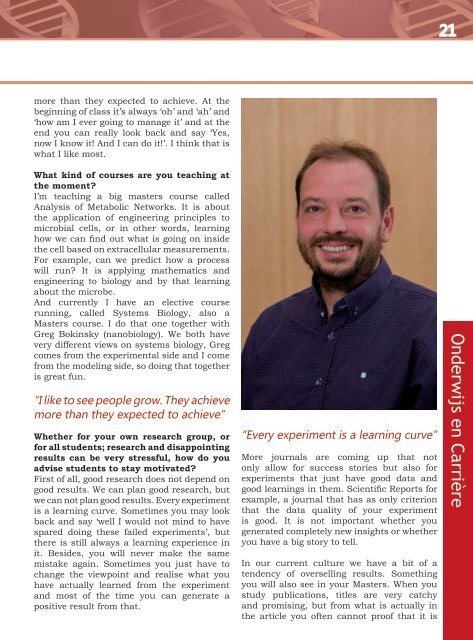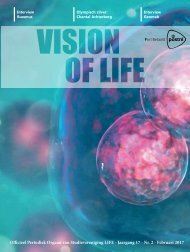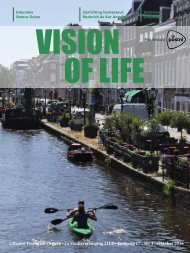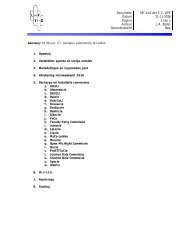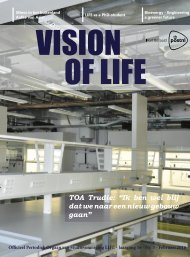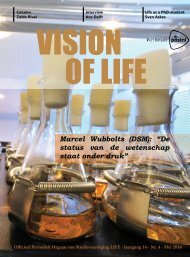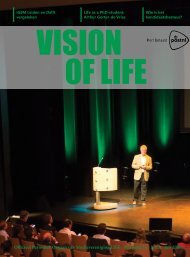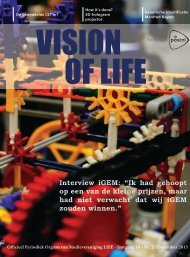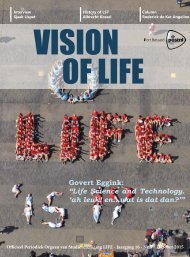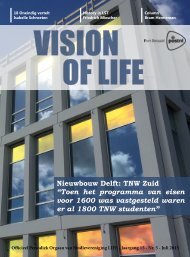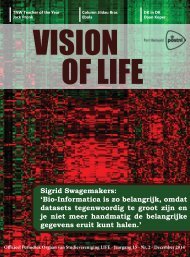You also want an ePaper? Increase the reach of your titles
YUMPU automatically turns print PDFs into web optimized ePapers that Google loves.
21<br />
more than they expected to achieve. At the<br />
beginning <strong>of</strong> class it’s always ‘oh’ and ‘ah’ and<br />
‘how am I ever going to manage it’ and at the<br />
end you can really look back and say ‘Yes,<br />
now I know it! And I can do it!’. I think that is<br />
what I like most.<br />
What kind <strong>of</strong> courses are you teaching at<br />
the moment?<br />
I’m teaching a big masters course called<br />
Analysis <strong>of</strong> Metabolic Networks. It is about<br />
the application <strong>of</strong> engineering principles to<br />
microbial cells, or in other words, learning<br />
how we can find out what is going on inside<br />
the cell based on extracellular measurements.<br />
For example, can we predict how a process<br />
will run? It is applying mathematics and<br />
engineering to biology and by that learning<br />
about the microbe.<br />
And currently I have an elective course<br />
running, called Systems Biology, also a<br />
Masters course. I do that one together with<br />
Greg Bokinsky (nanobiology). We both have<br />
very different views on systems biology, Greg<br />
comes from the experimental side and I come<br />
from the modeling side, so doing that together<br />
is great fun.<br />
“I like to see people grow. They achieve<br />
more than they expected to achieve”<br />
Whether for your own research group, or<br />
for all students; research and disappointing<br />
results can be very stressful, how do you<br />
advise students to stay motivated?<br />
First <strong>of</strong> all, good research does not depend on<br />
good results. We can plan good research, but<br />
we can not plan good results. Every experiment<br />
is a learning curve. Sometimes you may look<br />
back and say ‘well I would not mind to have<br />
spared doing these failed experiments’, but<br />
there is still always a learning experience in<br />
it. Besides, you will never make the same<br />
mistake again. Sometimes you just have to<br />
change the viewpoint and realise what you<br />
have actually learned from the experiment<br />
and most <strong>of</strong> the time you can generate a<br />
positive result from that.<br />
“Every experiment is a learning curve”<br />
More journals are coming up that not<br />
only allow for success stories but also for<br />
experiments that just have good data and<br />
good learnings in them. Scientific Reports for<br />
example, a journal that has as only criterion<br />
that the data quality <strong>of</strong> your experiment<br />
is good. It is not important whether you<br />
generated completely new insights or whether<br />
you have a big story to tell.<br />
In our current culture we have a bit <strong>of</strong> a<br />
tendency <strong>of</strong> overselling results. Something<br />
you will also see in your Masters. When you<br />
study publications, titles are very catchy<br />
and promising, but from what is actually in<br />
the article you <strong>of</strong>ten cannot pro<strong>of</strong> that it is<br />
Onderwijs en Carrière


